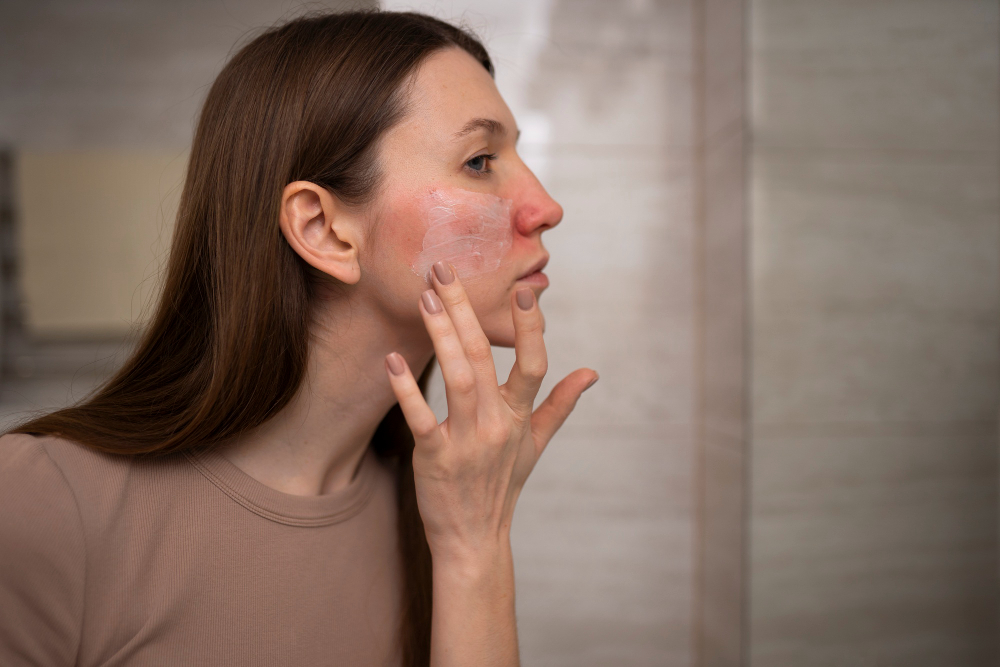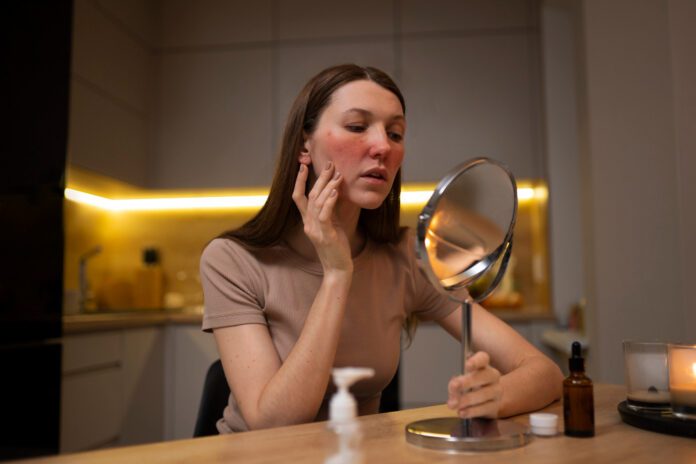Skincare for Redness or skin redness can be a perplexing and distressing issue, affecting individuals of all ages and skin types. The condition manifests through a variety of symptoms, including blotchy patches, consistent flushing, and inflamed areas that may cause discomfort.
Often, redness is a result of underlying conditions such as rosacea, eczema, or simply skin sensitivity. It’s crucial to identify the root cause of redness to tailor an effective skincare regimen that addresses specific needs.
Common Causes of Skin Redness
Several factors contribute to skin redness, ranging from genetic predispositions to environmental influences. Rosacea, a chronic inflammatory skin condition, is a primary cause of persistent facial redness, often accompanied by visible blood vessels and pimples. Eczema, another prevalent condition, leads to red, itchy, and inflamed skin, typically due to a dysfunctional skin barrier.
No products found.
External elements such as harsh weather, pollution, and over-exfoliation can exacerbate redness, as can lifestyle choices like diet and stress levels. Recognizing these triggers is pivotal in mitigating their impact.
Ingredients to Look For Skincare for Redness
When formulating a skincare routine to combat redness, it’s essential to incorporate ingredients known for their soothing and anti-inflammatory properties. Niacinamide, or vitamin B3, is a versatile ingredient celebrated for its ability to reduce inflammation and strengthen the skin barrier. Azelaic acid, naturally found in grains such as barley and wheat, offers anti-inflammatory and antimicrobial benefits, making it ideal for treating rosacea and acne-related redness.
No products found.
Green tea extract, rich in antioxidants, calms irritation and reduces redness while protecting the skin from environmental stressors. Additionally, centella asiatica, a medicinal herb, accelerates healing and diminishes redness through its potent anti-inflammatory properties.
Ingredients to Avoid
Equally important is the avoidance of ingredients that can aggravate skin redness. Fragrances, both synthetic and natural, are common culprits that can trigger irritation and allergic reactions. Alcohol, often found in toners and astringents, can strip the skin of its natural oils, leading to dryness and increased redness.

Harsh exfoliants, such as physical scrubs or high-concentration acids, can compromise the skin barrier and exacerbate inflammation. Understanding which ingredients to steer clear of can prevent further aggravation and promote a calmer complexion.
Skincare Routine Tips
Developing a skincare routine tailored to reducing redness involves selecting gentle, hydrating products and incorporating them strategically. Start with a mild, sulfate-free cleanser to remove impurities without stripping the skin of its natural moisture. Follow with a soothing toner, preferably one containing calming ingredients like chamomile or aloe vera.
No products found.
A serum infused with niacinamide or azelaic acid can then be applied to target redness and inflammation. Moisturizing is crucial; opt for a fragrance-free, non-comedogenic moisturizer to lock in hydration and support the skin barrier. Don’t forget broad-spectrum sunscreen, as UV exposure can significantly worsen redness.
Professional Treatments
For persistent or severe redness, professional treatments may offer more substantial relief. Dermatological options such as laser therapy and intense pulsed light (IPL) can reduce visible blood vessels and overall redness by targeting the underlying vessels causing the discoloration. Chemical peels, particularly those formulated with gentle acids, can exfoliate and renew the skin, improving its texture and tone.
No products found.
Microneedling, which stimulates collagen production, can enhance skin resilience and reduce redness over time. Consulting a dermatologist will help determine the most appropriate treatment based on individual skin concerns.
Lifestyle Changes to Support Skin Health
In addition to topical treatments, lifestyle adjustments play a significant role in managing skin redness. A diet rich in anti-inflammatory foods, such as omega-3 fatty acids, antioxidants, and vitamins, can support overall skin health.
Reducing the intake of alcohol and spicy foods, which can trigger flare-ups, is advisable. Managing stress through mindfulness practices, such as yoga or meditation, can also have a positive impact on skin condition. Ensuring adequate hydration and sleep further contributes to a balanced, healthy complexion.
The Role of Diet in Managing Skin Redness
Diet plays a pivotal role in skin health, and certain foods can either exacerbate or alleviate skin redness. Anti-inflammatory foods, such as fatty fish rich in omega-3 fatty acids, can help reduce inflammation and promote a more balanced skin complexion.
Incorporating a variety of fruits and vegetables high in antioxidants, such as berries, leafy greens, and citrus fruits, can protect the skin from oxidative stress and support the skin’s natural healing processes.
On the other hand, foods high in sugar, dairy, and refined carbohydrates can trigger inflammation and worsen skin conditions like rosacea and eczema. Maintaining a balanced diet with an emphasis on whole, unprocessed foods can significantly contribute to managing skin redness.
The Importance of Hydration
Hydration is a fundamental aspect of skincare, particularly for individuals dealing with redness. Proper hydration helps maintain the skin’s barrier function, preventing dryness and irritation that can lead to increased redness.
Drinking adequate water throughout the day ensures that the skin remains hydrated from within, promoting a healthy, radiant complexion. Additionally, using hydrating skincare products, such as hyaluronic acid serums and moisturizers, can provide the skin with essential moisture, reducing redness and improving overall skin texture. Ensuring both internal and external hydration is essential for maintaining a calm and balanced skin tone.
Protective Measures Against Environmental Factors
Environmental factors, such as sun exposure, pollution, and extreme weather conditions, can significantly impact skin redness. Protecting the skin from these external aggressors is crucial in managing and preventing redness.
Daily application of broad-spectrum sunscreen with a high SPF is essential to shield the skin from harmful UV rays that can exacerbate redness and cause long-term damage. Using protective clothing, such as wide-brimmed hats and sunglasses, can further safeguard the skin. Additionally, incorporating antioxidant-rich products into the skincare routine can help neutralize free radicals and minimize the adverse effects of pollution.
Taking proactive measures to protect the skin from environmental stressors can greatly contribute to reducing redness and maintaining a healthy complexion.
Conclusion
Addressing skin redness requires a multifaceted approach, combining targeted skincare products, professional treatments, and lifestyle adjustments.
By understanding the causes and adopting a thoughtful skincare regimen, individuals can achieve a calmer, more even complexion. Consistent care and attention to detail are key in mitigating redness and enhancing overall skin health.







